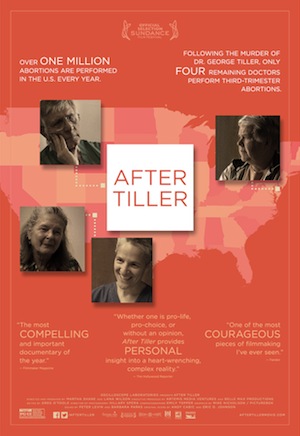| Directed by | Martha Shane |
| Lana Wilson | |
| Director of Photography | Hillary Spera |
| Cinematography | Emily Topper |
| Edited by | Greg O’Toole |
| Executive Producers | Artemis Media Ventures |
| Belle Max Productions | |
| Produced by | Martha Shane |
| Lana Wilson |
America is at war with itself over abortion. In other countries, this simple, legal, and in many cases life-saving medical procedure is a matter of personal, private choice. In the USA, it’s an act that elicits screams of protest, picket lines, macabre placards, and, in the case of Dr. George Tiller, a self-righteous fanatic with a gun.
Dr. Tiller specialized in third trimester abortion, a complex procedure that focuses on preserving the integrity of the mother’s reproductive organs whilst terminating her pregnancy at any point after twenty weeks. Despite the fact that these abortions count for less than 1% of those carried out in the United States each year, anti-abortion activists targeted Dr. Tiller and his clinic in Wichita, Kansas with tragic results.
On May 31, 2009, as he attended a church service with his family, Tiller was shot in the head by one such activist. Tiller’s assassination made him the eighth abortion clinic worker to be murdered since Roe vs. Wade, and also wiped out his Wichita clinic and the health services provided to Kansas women.
In the wake of this tragedy, only four doctors in the United States, all friends and former colleagues of Dr. Tiller, offer specialist third trimester abortions. AFTER TILLER, Martha Lane and Shana Wilson’s thoughtful documentary, explores their daily practice, interviewing them, the workers in their clinics, and the patients who seek their help.
The overall picture is heartbreaking. In an ideal world, no woman would want or need an abortion, but the patients of these clinics have to face some grim realities. A large proportion of those seeking to end their pregnancy at this late stage have discovered major fetal abnormalities. Many tests, especially for brain formation and function, only reveal problems in the later stages of gestation. The parents have to make a devastating decision about whether they should bring a severely disabled child into the world, and deal with their short, painful existence, or whether they should go through the emotional trauma of a termination. Other patients are victims of rape, or have been in horrified denial about their condition for too long.
Every situation is complex, there are no absolutes, just endless shades of grey. Everyone is aware that they’re discussing the ending of a potential human life, and it’s a decision no one takes quickly or lightly. It’s hard not to weep in sympathy as the women, faces unseen, relate their painful and often convoluted stories to the doctors, shredding boxes full of paper tissues in the process. Yet for those who work in the clinics, this anguish, these dilemmas constitute their nine-to-five.
AFTER TILLER offers insights into the life of the doctors as well as the patients. These senior clinicians have had long and storied medical careers, and are passionate about the choice they have made to specialize in this work. They have to be. In dry, matter-of-fact tones they reveal what it’s like to practice medicine on the front lines, how you feel when you turn up at work to find bullet holes in the office door, when you’re harassed on a daily basis by protestors clumped outside your front gate, when landlords won’t rent premises to you for fear of repercussions, when anti-abortion activists set fire to your property and threaten your family. They’re blunt about why they do what they do: because somebody has to.
These doctors are old enough to recall the dark times before Roe vs. Wade, when for every hospital ward full of women recovering from giving birth, there were two filled with those recovering from botched or self-administered abortions. They’ve spent their professional lives at war with the pro-lifers, and are only too aware, forty years after abortion became legal in the United States, that nothing about the procedure or a woman’s freedom to choose can be taken for granted. The vitriolic debate still rages, and there’s no end in sight. None of the doctors have immediate plans to retire.
AFTER TILLER isn’t going to change anyone’s entrenched opinion on abortion. Nonetheless, the gentle, personal approach taken by the filmmakers, focusing on specific stories, eschewing broad rhetoric, makes a welcome contribution to the discussion. Lane and Wilson have done some important work in documenting the everyday experiences of those directly affected by the act and consequences of third trimester abortion. Perhaps politicians, activists and law-makers who like to argue against abortion from a purely ideological standpoint would do well to listen to these voices of actual experience with an open mind?
After Tiller will screen at selected locations around the country from today. For more information about screening times and dates in your area, see http://aftertillermovie.com/
